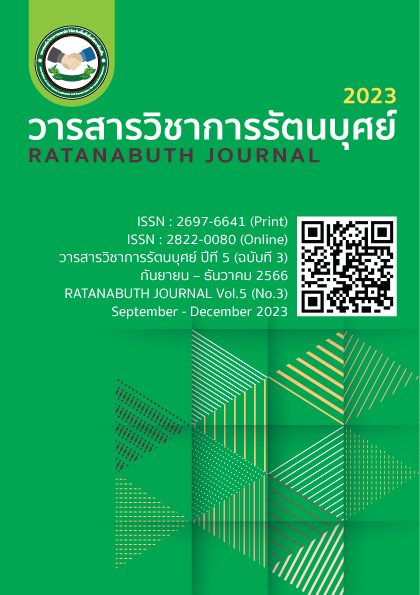Improving the Quality of Life of Teachers and Educational Personnel with the Philosophy of Sufficiency Economy Improving the Quality of Life of Teachers and Educational Personnel with the Philosophy of Sufficiency Economy
Main Article Content
Abstract
As teachers and educational personnel face serious debt problems. The author therefore aims to present a solution to this problem for teachers and educational personnel. This is because teachers and educational personnel are persons who have been hired and appointed under this Act to serve in government service and receive a salary from the national budget. Currently facing debt problems as well as other expenses that is so burdensome that it is unable to work at full efficiency. The proposed solution is that teachers or educational personnel should embrace the philosophy of Sufficiency Economy to direct their lives to be consistent with the reality of the situation at all three levels, he said is level 1) quality of life according to the philosophy of sufficiency economy at the level of having enough to live on, level 2) Quality of life according to the philosophy of sufficiency economy at the level of living well, level 3) Quality of life according to the philosophy of Sufficiency Economy at the level of wealth and happiness. To enable teachers and educational personnel to develop and enhance the quality of life mentally and socially, economic conditions, learning technology and preserving natural resources and the environment. As well as helping to maintain the village/community to develop sustainably and continue investing in the community, starting with oneself, family, community, and the nation.
Article Details

This work is licensed under a Creative Commons Attribution-NonCommercial-NoDerivatives 4.0 International License.
References
กระทรวงมหาดไทย. (2558). แบบประเมินหมู่บ้านเศรษฐกิจพอเพียงกระทรวงมหาดไทย (4 x 23 ตัวชี้วัด). สืบค้นเมื่อ 1 สิงหาคม 2566 จาก www.cddburiram.com/photo1/139.doc.
กรมการพัฒนาชุมชน. (2548). รายงานประจําปีของกรมการพัฒนาชุมมชน. กรุงเทพฯ : กรมการพัฒนาชุมชนกระทรวงมหาดไทย.
กุหลาบ รัตนสัจธรรม และคณะ. (2535). การพัฒนารูปแบบที่เหมาะสมในวิธีการดําเนินงาน วางแผนพัฒนาคุณภาพชีวิตตามเกณฑ์จําเป็นพื้นฐานในระดับหมู่บ้าน. กรุงเทพฯ: โครงการน้ำพระทัยจากในหลวงเพื่อพัฒนาภาตะวันออกเฉียงเหนือ สถาบันวิจัยพืชสวนและสำนักงานเศรษฐกิจการเกษตร.
ชุมพร พลรักษ์, เฉลิม วงศ์ไพร และเมธี ธรรมรังสี. (2549). พระมหากษัตริย์นักพัฒนา. ฉะเชิงเทรา : โรงพิมพ์ประสานมิตร.
ณรงค์ จริยวิทยานนท์. (2542). สังคมศึกษา 1 วิชาบังคับ. กศน. ม.ปลาย. กรุงเทพฯ : ประสานมิตร
ธเนศน์ นุ่นมัน. (255ต). มหา'ลัยล้น ห้องเรียนร้าง วิกฤตอุดมศึกษาไทย. สืบค้นเมื่อ 7 กันยายน 2566 จาก https://www.posttoday.com/politics/427241.
ธรรมนูญ วิถี.พ.อ. (2547). ป้จจัยท็มีความสัมพันธ์กับคุณภาพซีวิตของทหารกองประจําการ กรมทหารราบที่ 12 รักษาพระองค์. ปัญหาพิเศษ รัฐประศาสนศาสตรมหาบัณฑิต สาขาวิชานโยบายสาธารณะ.ชลบุรี:บัณฑิตวิทยาลัย มหาวิทยาลัยบูรพา.
นิคม มูสิกะคามะ. (2545). วัฒนธรรม : บทบาทใหม่ในยุคโลกาภิวัตน์. กรุงเทพฯ : กรมศิลปากร.
นิศารัตน์ ศิลปเดช. (2540). ประชากรกับการพัฒนาคุณภาพชีวิต. กรุงเทพฯ: ภาควิชาสังคมวิทยา คณะมนุษยศาสตร์และสังคมศาสตร์ สถาบันราชภัฎธนบุรี.
มูลนิธิชัยพัฒนา.(2548).เศรษฐกิจพอเพียง.สืบค้นเมื่อ 6 สิงหาคม 2566 จาก http://www.sufficencyeconomy.org.
ราชบัณฑิตยสถาน. (2525). พจนานุกรมฉบับราชบัณฑิตยสถาน พ.ศ.2525. (พิมพ์ครั้งที่5). กรุงเทพมหานคร: บริษัท อักษรเจริญทัศน์ อจท. จำกัด.
สนุก สิงห์มาตร.(2561). กลยุทธ์การพัฒนาคุณภาพชีวิตตามวิถีปรัชญาของเศรษฐกิจพอเพียงสำหรับครูและบุคลากรทางการศึกษาในพื้นที่จังหวัดยโสธร.วารสารวิชาการธรรมทัศน์,18(1)
สำนักงานคณะกรรมการพิเศษเพื่อประสานงานโครงการอันเนื่องมาจากพระราชดำริ. (2550). เศรษฐกิจพอเพียงปรัชญาชี้ถึงแนวทางการดำรงชีวิต. กรุงเทพมหานคร : สำนักงาน กปร.
สิปปนนท์ เกตุทัต. (2547). ธนาคารสมอง : คลังปัญญาคุณค่าผู้สูงอายุ. ใน สุทธิชัย จิตะพันธ์กุล. (บรรณาธิการ). รายงานการประชุมวิชาการระดับชาติ. กรุงเทพฯ : จุฬาลงกรณ์มหาวิทยาลัย.
เสนาะ ติเยาว์. (2543). หลักการบริหาร. กรุงเทพฯ : โรงพิมพ์มหาวิทยาลัยธรรมศาสตร์.
UNESCO. (1978). Indicator of Environmental Quality of Life. Research and Papers in Social Science, no.38. Paris: UNESCO.


